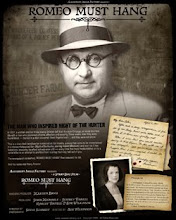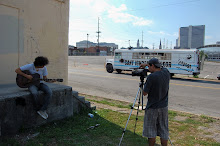Local filmmaker documents plight of homeless; film making a big impact - Ripley, WV - Jackson Newspapers
Posted using ShareThis
By Christina Bright
The Jackson Herald
Tue Nov 17, 2009, 11:15 AM EST
Ripley, W.Va. -
Traveling by a bus that ran on cooking oil, eating out of dumpsters when necessary, seeking out those many people try to avoid. It might not sound like an experience many would want, but for local filmmaker Bob Wilkinson, it was all part of a documentary to show the plight of homeless people in the south.
It all started a couple of years ago when The Bridge, an area ministry started by Wilkinson’s wife Charessa, was hosting the Rock in Love Tour. She had invited Brandt Russo to attend and share his story with the young people who attended the multi-town event. Russo had become jaded by the religious establishment and followed the instructions of Jesus: sold his possessions and dedicated himself to helping those less fortunate.
Russo spent a week with the Wilkinsons during that time. “We became really good friends,” Charessa said. “At the time, he was really timid. We helped him make that transition and became like a family for him.”
It was during the Cornerstone Festival, which Charessa called a “hippy Christian music fest,” that Russo said he was not going to allow any more media access or film footage of him. Bob jokingly asked if that meant he couldn’t make a film featuring Russo. But when Russo said he would allow him to, Bob began to take the idea seriously.
After finding a diesel mechanic and military man in Ripley who was willing to help make repairs to the bus emblazoned with the motto “Can’t Ignore the Poor,” Wilkinson and Russo left Jackson County and headed south with no money and no idea what the next two weeks would bring. “I told him I’d go out and live like him,” Wilkinson said.
Wilkinson has making films since 2000 as a college student and has made a career of it. He has been working for West Virginia Public Broadcasting. He has produced several documentaries including “Rounding Third,” a history of Charleston’s minor league’s Watt Powell Park, and “John Brown’s Body,” a look at the legacy of Brown’s raid in Harper’s Ferry. His first independent documentary was “Shades of Gray,” a portrait of the man behind the Men in Black legend. It was picked up for distribution by Media 8/Trillian Entertainment.
This latest film is called “Adopt-a-Jesus,” named for the project Russo was trying to get off the ground in Houston. The project involved photographing homeless people around the city and encouraging others to “adopt” them – by seeking them out, learning about them, bringing them some food, and other small gestures to show them people care.
Between Ripley and Houston, they stopped in major cities along the way, interviewing homeless people, learning their stories, and feeding them. Wilkinson said he and Russo, accompanied by Jonathan James who photographed their trip, mostly found food stores and restaurants had thrown out – food that was still perfectly good but wasn’t sold. At one point they found 100 boxes of crackers that had been thrown out because the boxes were dented. Those crackers were donated to a local soup kitchen.
They had to rely on the fact people threw out cooking oil to literally fuel their trip. People were reluctant to give them used oil, which meant they had to take what was being discarded. Bob explained the bus ran on diesel until the oil reached a certain temperature and then the conversion would happen automatically. “We made it to Houston on very little money,” he said.
The trip certainly was eye-opening, not only in terms of the conditions of the homeless, but also in terms of how they are treated by everyone, including the church. Often, they would be run off church parking lots where they would park for the night.
Eventually they ended up at Lakewood Church in Houston, home of television evangelist and best-selling author Joel Olsteen. When Russo, with his long hair, piercings, tattoos, and raggedy clothes, walked in and sat down in the front row, he was escorted toward the back where cameras would not film him.
An usher later apologized, saying that he did not feel the same as the other ushers, and neither did Olsteen. The Adopt-a-Jesus project was set up outside the Lakewood Church. However, security guards quickly broke up their demonstration as people walked passed, paying little attention to their pleas for the homeless.
But they did find some positive stories along the way. A stop a Loretta Lynn’s Kitchen was one. Wilkinson said anyone is welcome to eat there regardless of their ability to pay. They also found a family who purchased a former crack house and refurbished it to make a group home.
These are the stories that helped shape the film, one Wilkinson said will cause everyone who sees it to “question your position on things.” Originally set for a 10-day run, it is turning into a five month run across the country. Russo is traveling to be at each screening during this time to help share his story. The film will have a few showings in West Virginia beginning at the end of November.
On November 30, “Adopt-a-Jesus” will be shown at the student union of West Virginia State at 7 p.m. On December 1 Marshall University will show the film in Smith Hall. Several campus groups and departments are joining forces to show the film and hold a coat drive in conjunction.
The film will be shown in Ripley on December 4 at 7 p.m. at Phoenix Rising Tattoo on Main Street.
A trailer for the film can be viewed at YouTube. For more information on screenings, visit adoptajesus.com.
Subscribe to:
Post Comments (Atom)







No comments:
Post a Comment